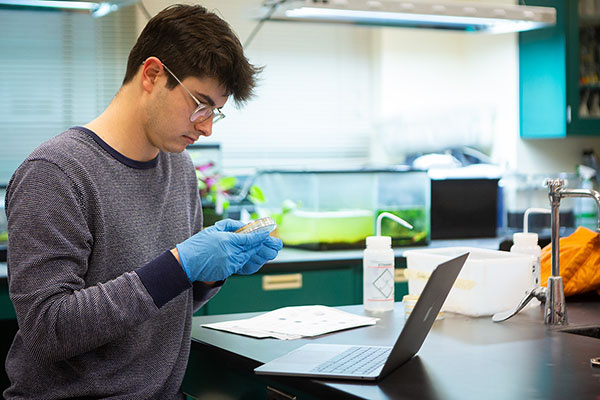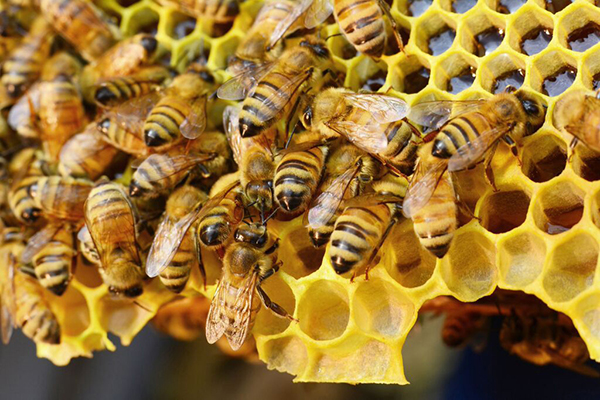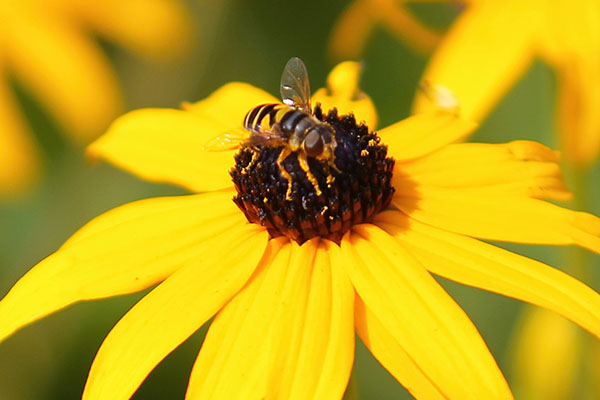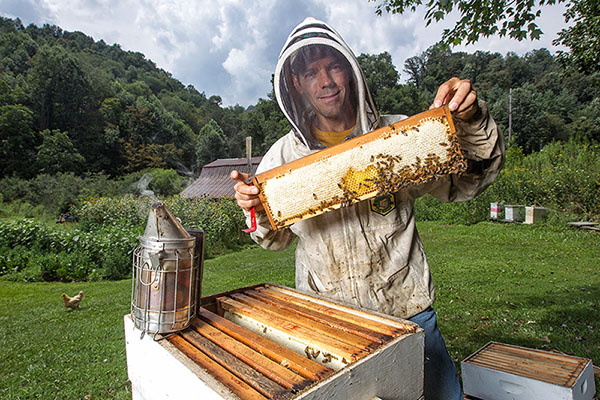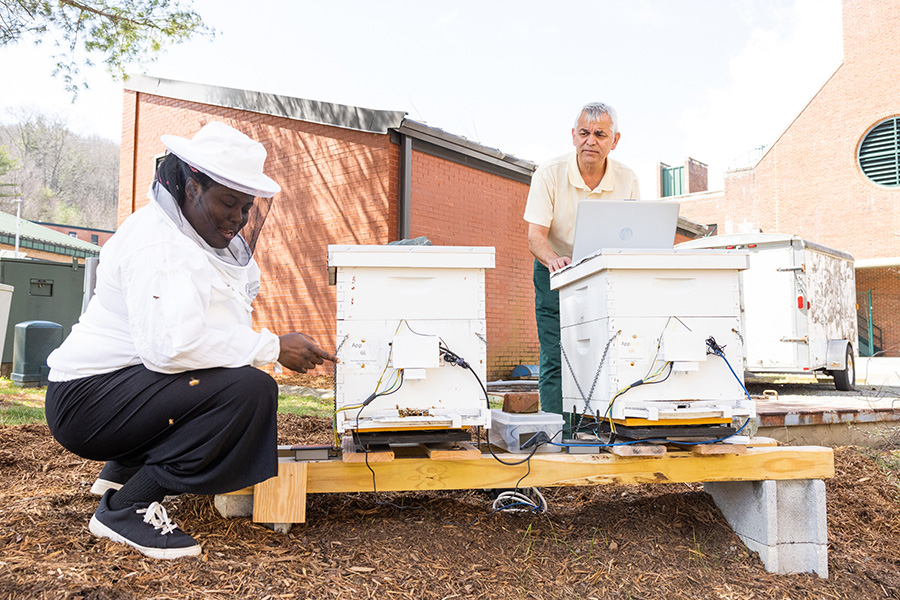
App State senior Temitayo Olofintuyi, left, a Beemon research team member and computer science major from Greensboro, and Dr. Rahman Tashakkori, the Lowe’s Distinguished Professor of Computer Science in App State’s Department of Computer Science, inspect two Beemon Hive Monitoring Systems on App State’s Boone campus. Tashakkori and his research team received a grant for over $640,000 from NCInnovation to commercialize four parts of the Beemon Hive Monitoring System. Photo by Chase Reynolds
BOONE, N.C. — At Appalachian State University, research by Dr. Rahman Tashakkori and his team is contributing to the development of an innovative tool for decreasing honeybee die-off and increasing hive production. Their effort to produce turnkey products for commercial and amateur beekeepers is moving one step closer thanks to a $641,951 grant from NCInnovation.
NCInnovation is a nonprofit corporation and public-private partnership focused on supporting North Carolina public university research that has commercial promise. NCInnovation deploys funding, mentors and support services so that North Carolina university proofs of concept can turn into companies and create jobs that remain in the state.
“Our faculty are recognized nationally for their innovative research and teaching,” said App State Interim Chancellor Heather Norris. “Their work is having a positive impact in Western North Carolina and beyond. On behalf of Appalachian State University, we extend our appreciation to our state lawmakers and NCInnovation for believing in and supporting applied research at App State.”
Tashakkori, the Lowe’s Distinguished Professor of Computer Science in App State’s Department of Computer Science, has spent years leading the development of the revolutionary Beemon Hive Monitoring System, which provides beekeepers with valuable insights on honeybee colonies by recording bee movements, sounds, and body stripe patterns, and by utilizing other measurement tools. The hope is that improved data can be used to preserve the health of honeybees more efficiently and accurately. A 2023 study found that honeybee colonies, which are vital to the world’s agriculture and the food supply, have been dying at staggering rates.
The NCInnovation grant is split over a two-year period, with the first year of funding supporting design finalization for the four Beemon system components, as well as market analysis and intellectual property investigation. In the project’s second year, the Beemon team will focus on testing and earning patents for the four components and identifying mass production facilities. Each of these components has been designed and built in App State’s Computer Science Visual and Image Processing Lab with the assistance of three-dimensional printers.
App State’s grant is one of eight initial pilot grants awarded by NCInnovation, which received state funding support to establish an endowment in the 2023–24 budget. The pilot grants, totaling $5.2 million, were announced in May, and App State finalized its grant agreement in July.
“Our network of statewide research universities is an incredible asset for North Carolina,” said Michelle Bolas, NCInnovation executive vice president and chief innovation officer. “The work underway at Appalachian State University from Dr. Tashakkori has exciting potential for Western North Carolina and other parts of the country.”
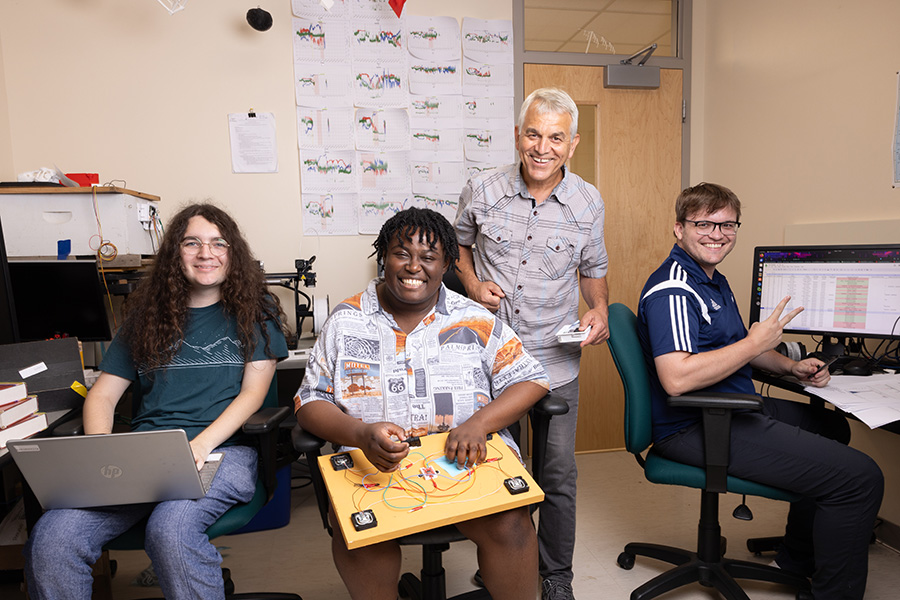
Dr. Rahman Tashakkori, the Lowe’s Distinguished Professor of Computer Science in App State’s Department of Computer Science, second from right, is pictured in his bee research lab on App State’s Boone campus with three student members of his Beemon research team. Pictured, from left to right, are Will O’Brien ’23 ’24, a recent graduate of App State’s computer science master’s program who served as student manager for the project; Temitayo Olofintuyi, a senior computer science major from Greensboro; and Logan Richardson ’14 ’24, who graduated from App State in August with a Master of Science in computer science and served as the team’s data visualization specialist. The team received an NCInnovation grant this spring for over $640,000 to commercialize four parts of the Beemon Hive Monitoring System. Photo by Chase Reynolds
Years of faculty, student collaboration
Approximately 12 years ago, Tashakkori and a Department of Computer Science colleague, Dr. James Wilkes, department chair, were enjoying a cup of coffee. Wilkes, a beekeeper who had learned the practice from his father, expressed concern that he was losing bees.
“My good friend, Dr. Wilkes, is a beekeeper and he always complained that he has been losing bees — 30%, 50%,” said Tashakkori. “My area of research is actually in image processing, so I said, ‘Maybe I can put the camera in front of the hives and see what the behavior is. Maybe we can learn from that.’ So using a home security camera, I set up surveillance of some hives, and that’s how all this started.”
Tashakkori’s team would go on to utilize various funding sources and grants to expand their research, including support from the Lowe’s Distinguished Professor Fund — which is part of Tashakkori’s endowed professorship with the university.
In 2021, Tashakkori and his interdisciplinary team of researchers — Dr. Abdelbaset Hamza and Dr. Mitch Parry in the Department of Computer Science, Dr. Clare Scott Chialvo in the Department of Biology, Dr. Jennifer Weller in the Department of Bioinformatics and Genomics at the University of North Carolina at Charlotte and computer science, biology and biochemistry students from App State and UNC-Charlotte — received a three-year, $1.1 million grant through the University of North Carolina System’s Research Opportunities Initiative (ROI). The ROI grant ended June 30.
The research team investigated the health, development and genomic diversity of 30 honeybee hives in North Carolina through video surveillance, audio recordings, weight measurements and DNA samples.
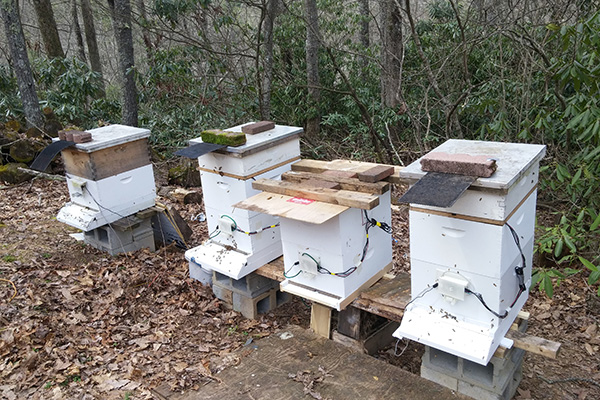
Four Beemon Hive Monitoring Systems in the Boone community that are set up to monitor and record data on beehive health and hardiness. App State’s Beemon research team just completed a three-year, $1.1 million grant through the University of North Carolina System’s Research Opportunities Initiative that ended on June 30, and the team has received a two-year, $641,951 NCInnovation grant to commercialize four parts of the Beemon Hive Monitoring System. Photo submitted
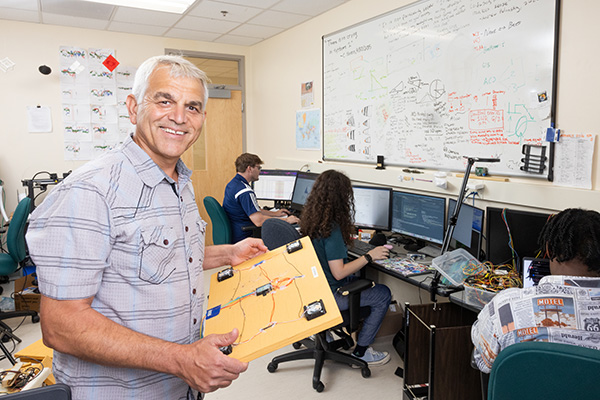
Dr. Rahman Tashakkori, the Lowe’s Distinguished Professor of Computer Science in App State’s Department of Computer Science, far left, has been conducting beehive research for over 12 years. His research has advanced to include visual inspection — such as abdominal markings of honeybees, as seen on the dry-erase board to the right — and audio recordings. This research earned an NCInnovation grant of over $640,000 to commercialize four parts of the Beemon Hive Monitoring System. Photo by Chase Reynolds
“Through our research, we have been able to track changes in the hives to include when a hive is about to split or move,” Tashakkori said. “Unfortunately, during this study we have lost hives and research equipment — thanks to bears. The bears enjoy honey!”
In April, the team consolidated a number of hives at App State’s Sustainable Development Teaching and Research Farm, located in Fleetwood, in neighboring Ashe County. They have been working with students and managers there to continue to maintain the hives. The research team also relies on citizen scientists in the region, who host pairs of hives on their properties in diverse locations and provide data to the project, as well as three hives in Belgium.
“We have enjoyed the opportunity to collect data from the hives in Belgium because they have a different climate and hardiness to compare to our local bee populations,” stated Tashakkori. “We have also exchanged bee observations, knowledge and experiences to aid in strengthening both populations. This provides our students with broadened educational experiences.”
Tashakkori’s team is currently seeking additional funding to expand the number and climate range of hives being monitored.
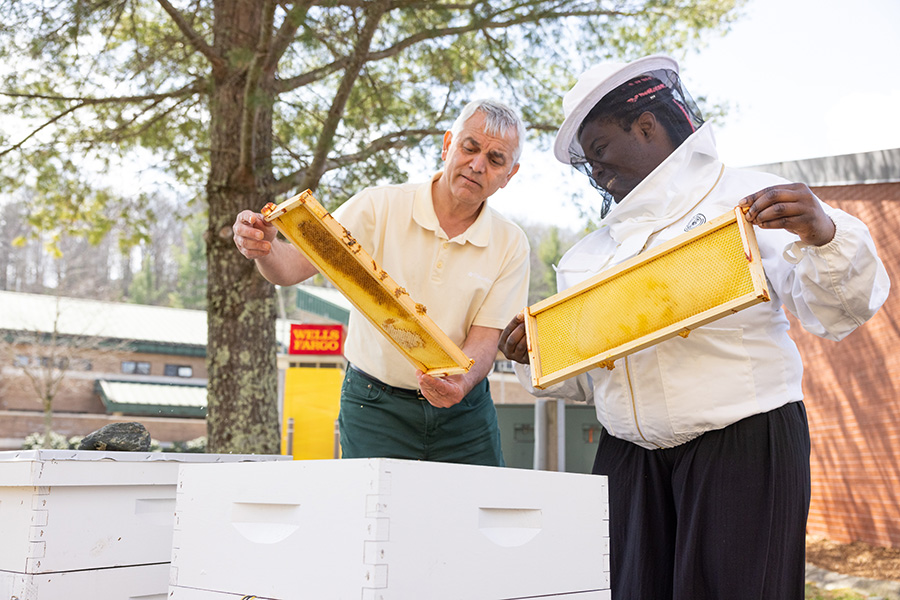
Dr. Rahman Tashakkori, the Lowe’s Distinguished Professor of Computer Science in App State’s Department of Computer Science, left, and Temitayo Olofintuyi, a Beemon research team member and senior computer science major from Greensboro, examine honey from one of the hives on the Boone campus. Tashakkori’s team has been conducting bee research for over 12 years, and the team received an NCInnovation grant of more than $641,000 this spring to commercialize four parts of the Beemon Hive Monitoring System. Photo by Chase Reynolds
App State students gain real-world research experience
Since beginning his hive research project 12 years ago, Tashakkori has been able to provide an opportunity for eight to 10 students each year to participate in this program.
“Grants like the NC Innovation grant provide a tremendous opportunity for this interdisciplinary team of undergraduate and graduate research students to find purpose in their efforts as well as connect with the community at large,” he said.
Will O’Brien ’23 ’24, who recently earned his computer science master’s degree through App State’s Accelerated Master’s program and served as student manager for the Beemon project, remarked that the commercialization of these components will have a greater impact for more App State students.
“I remember Dr. Tashakkori showed my orientation group around, and I never thought I would be a part of this program and combine my two passions — computer science and environmental science,” said O’Brien, who became the full-time research associate on the NCInnovation project for App State this fall. “Now, I will be able to look back on the successful research and coding I have done as part of this team.”
App State alumnus Logan Richardson ’14 ’24, who graduated from App State this summer with a Master of Science in computer science, shared that his experience as a data visualization specialist on the Beemon research team has benefited him in his current career.
“Through this team, I have been able to continue to develop my skills and gain experience in software engineering,” said Richardson, who is now an electrical ground support equipment software engineer at spaceflight company Blue Origin in Florida. “That is something that has a meaningful impact for all the students on this team.”
Beemon research team member Temitayo Olofintuyi, a senior computer science major from Greensboro, has utilized machine learning to analyze bee abdomen markings for signs of hive health and hardiness.
“I have also learned the value of having multiple team members that provide their own perspective to the same problem,” Olofintuyi said. “Different ideas provide creative solutions.”
What do you think?
Share your feedback on this story.
A new beekeeping information system developed by App State faculty and funded by the UNC System could help boost U.S. honeybee populations.
The local community is invited to view and submit observations of the Department of Computer Science’s Beemon system
Appalachian student and faculty researchers seek to recover declining honeybee population
About the Department of Computer Science
Appalachian’s Department of Computer Science provides a rigorous, high-quality education that prepares students for the computing industry or graduate education. It offers a Bachelor of Science degree in computer science, which is accredited by the Computing Accreditation Commission of ABET, and a Master of Science degree in computer science. Learn more at https://compsci.appstate.edu.
About the College of Arts and Sciences
The College of Arts and Sciences (CAS) at Appalachian State University is home to 17 academic departments, two centers and one residential college. These units span the humanities and the social, mathematical and natural sciences. CAS aims to develop a distinctive identity built upon our university's strengths, traditions and locations. The college’s values lie not only in service to the university and local community, but through inspiring, training, educating and sustaining the development of its students as global citizens. More than 6,800 student majors are enrolled in the college. As the college is also largely responsible for implementing App State’s general education curriculum, it is heavily involved in the education of all students at the university, including those pursuing majors in other colleges. Learn more at https://cas.appstate.edu.
About Appalachian State University
As a premier public institution, Appalachian State University prepares students to lead purposeful lives. App State is one of 17 campuses in the University of North Carolina System, with a national reputation for innovative teaching and opening access to a high-quality, cost-effective education. The university enrolls more than 21,000 students, has a low student-to-faculty ratio and offers more than 150 undergraduate and 80 graduate majors at its Boone and Hickory campuses and through App State Online. Learn more at https://www.appstate.edu.
